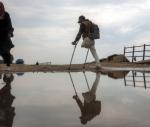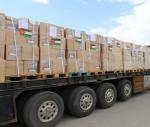You are here
Jordan faces critical water shortage crisis and its allies should step in
Apr 28,2021 - Last updated at Apr 28,2021
Jordanians are being warned to expect critical water shortages this summer largely due to a poor rainy season, which only reached 60 per cent of the average annual rainfall. The Ministry of Water and Irrigation has talked about water rationing plans that would limit the amount of water pumped to households at 5 cubic metres weekly. Jordan ranks fifth in the world as a water stressed country where the average share per individual is less than 1 per cent of the global average at 100 cubic metres annually while it reaches 1300 cubic metres annually in neighbouring countries.
Jordan gets about 60 per cent of its fresh water supply from aquifers that are replenished by rainfall. This year will prove exceptionally hard for Jordanians due to a poor rainy season. The rest of its needs it gets from surface water from the Sea of Galilee and the Jordan and Yarmouk river basins, which are controlled by Israel. Under the Jordan-Israel peace treaty Jordan receives a fixed share of water from Israel while it compensates the deficit by buying it — if the Israelis approve the sale. This year Jordan bought an additional 8 million cubic metres of water from Israel. Israeli Prime Minister Benjamin Netanyahu took his time before approving the sale and only after the US advised him to do so.
Jordan’s water shortage is not new, but has exacerbated in recent years due to a rise in population, now 10 million, partly because it hosts 1.3 million Syrian refugees. Other critical factors play a role such as climate change, poor infrastructure, where there is 50 per cent waste overall, and over-pumping. The largely desert kingdom lacks commercially viable oil and gas deposits that some of its neighbours have, which limits its ability to adopt expensive solutions such as desalinating seawater.
With an average rainfall of less than 50 millimetres each year, the country can no longer depend on an unpredictable rainy season to replenish its aquifers. Meanwhile, 45 per cent of the water usage goes to agriculture, while municipal water networks lose roughly half their water to theft and leaks, according to studies. Part of the problem was resolved by pumping water from the ancient water basin of Disi in southern Jordan, but it is a non-renewable aquifer and it will dry up eventually. Currently 90 million cubic metres are pumped from Disi providing drinking water to Amman and Aqaba.
Jordan has been talking about building a desalination station at Aqaba for years but little has been done due to lack of funding. The same goes for the strategic Red-Dead water conveyance canal, a project that Jordan and Israel agreed to undertake in 2013 but has been stalled.
Jordan blames Israel for failing to meet its obligations. The project would pump water from the Red Sea to the Dead Sea, generating electricity that would be used to desalinate water while dumping brine into the Dead Sea, which would help to stabilise the shrinking lake. But even then and if the canal is finished by 2025, it would contribute roughly 10 per cent of the country’s water needs.
This dire situation requires regional and international intervention to come to the aid of Jordan. The country faces a myriad of challenges including the pandemic and a stalling economy that has pushed the unemployment rate to 24 per cent and even more among youth. It is clear that under Netanyahu, Israel will buy its time before it gives Jordan its fair share of water from the Jordan and Yarmouk rivers. Simply put Israel is using Jordan’s water needs as a tool to exert political concessions.
Experts agree that the only viable solution is to build a major desalination station on the Red Sea. This project is long overdue and Jordan’s neighbours should contemplate investing in this project along with the private sector. They also believe that as Jordan struggles to divert its water resources to meet drinking needs the agricultural sector will suffer and that could create a shortage in essential vegetable and fruit production as well.
Water security is something that cannot be ignored or left to the whim of politicians. Jordan’s neighbours and allies should rally to help the Kingdom deal with its water shortages by investing in an array of projects like upgrading the poor water network and funding a desalination station in Aqaba. The US, a strategic ally of Jordan, should pressure Israel to meet its obligation towards the Red-Dead water conveyance project as soon as possible. Wealthy allies of Jordan should call for an emergency fund raising conference to set aside resources to carry out critically needed projects. This should be done as soon as possible.
The stability of Jordan is of paramount importance to regional peace. This has been exhibited by the regional and international messages of solidarity with the Kingdom following the latest political crisis, which involved a conspiracy to destabilise the country. Solidarity should extend to helping the country face what is proving to be a dire existential challenge.
Osama Al Sharif is a journalist and political commentator based in Amman.













